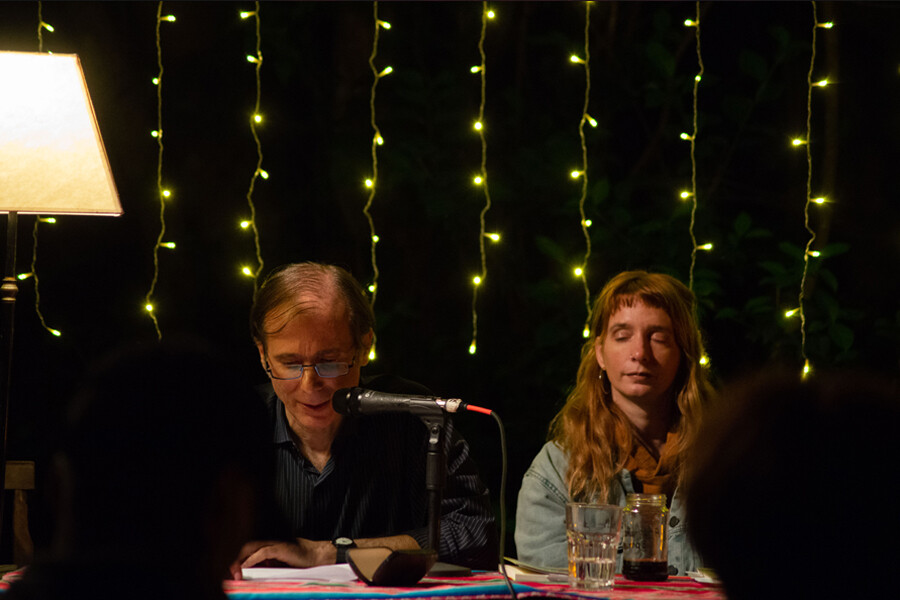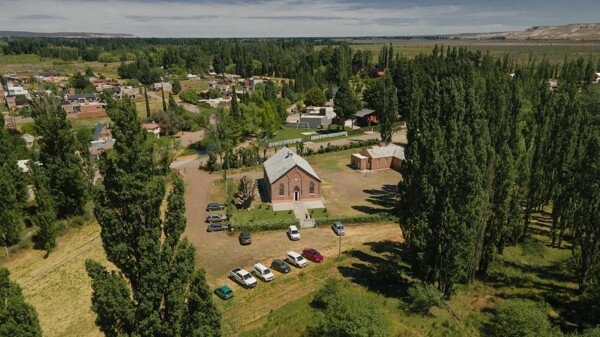
Desire opens a body illuminated by the inhabitants of the sea. At the doors of the hospice, the narrator abandons almost everything. On the way, something arrives when no one expects it: a "iridescence of time." Between the living and the speaker, there is an abyss. Nothing that language shows is where the words say it is. The tale is written blindly because in blindness the power to be all ears is updated.
A senseless insistence holds her hand and writes. In memory, a spectral past beats. However, Bárbara Alí hears them speak and reads the unheard pentagram of rhythm that, between the said and the unsaid, sets a never-ending restart: "Did you see? Opacity falters at the margins. It comes to us and brings with it the Other of time. At what speed is it written?
And Alí rests in that quagmire. There is nothing but water, slippery currents, and writing. A passport to the reverse of language. What would happen if we left a mirror under the rain? Time leaves us speechless and only there, only there, it writes leaving the incessant trace of its disappearance.
Reading table of the novel in Punta Indio. Between speakers and livings, the animal love of the narrator becomes writing. The scales lack a beginning or end, above or below. "I wish I become a vine." What moves a writing? Against the light, it exercises the ridiculous trade of not knowing. To tell is always to tell halfway so that the story doesn't end and the desired body endures as a ghost, in the babble that tastes it for the penultimate time.
The water dissolves the ink of the letters. It lets itself be carried away and sunk by an impulse that measures without having what paradoxically lacks measure. Poetry celebrates that wandering and engenders a new body. Ambushed among rocks and anemones, they slide and spread. They simply express themselves under the alternation of rest and movement. There is a rupture, there are wrecks, there are remains, and especially, a secret melody that drags whoever, unwittingly and unbidden, pays attention.
The author and her book, Editorial Golosina. At what speed does one live? It is not that time passes or ceases to pass. It comes to us and brings with it the Other of time: "(... ) things and little things that one doesn't quite know what they are but that are recognized by touch." The present does not coincide with itself and the statements do not either. Like Elizabeth Bishop, Bárbara Alí seeks to lose everything at the hands of language. Time comes. I am an old woman wanting to return to the warmth of the maternal womb, wishing to start all over again (...)
To desire. The confinement and medicalization of the delirious body constitute its best response. Where to immerse oneself in the image or the water activates the innate uprooting of our species. At the height of things, that is, in the omen of its nakedness, the intertwining of bodies speaks for her: "I hold the azalea tightly, I wish a thorn would pierce my chest, a creeping plant would copulate inside me and begin to expand. The epigraphs anticipate and take care of this enigma: "To desire is to carry the destiny of the sea within the body." To abandon the sea is to get lost in the programmed labyrinth of aquariums or self-help fish tanks. The sexes have no seat.
To write. Writing dispenses with directions. Tenacity of enchantment: "Since that day I assemble poems like prayers on holy cards, aphrodisiac spells, and I read them secretly, under the sheet, on winter nights." The song of birds or the wild roar of the depths modulates the imminence of an uncertain event: If you keep looking fixedly, the sky-sea moves. Without clocks or grammar, the world expires. The spirit of enterprise rejects the anonymous music that insists and persists in language. In that infinite, the novel traverses unpredictable burrows.
One by one, the words arrive, then, at the shores of the sea. The sea within the body of Bárbara Alí. Who desires when desiring? The managed world barely knows her. White background in the unseasonably rocker figure of the narrator or white on white like in Kazimir Malevich’s painting. It is ego that says ego.) There are, it is true, animals: snails, sharks, octopuses, scorpions. They retain the contingent tremor of darkness. That which Kant needed to deny to tie knowledge to the conditions and disconnect art from any purpose that would enclose it in the domesticity of merchandise or enterprise: "Will you hear the silence? Everything around starts to swirl, nothing stops." Barbara Alí rests in that quagmire.
Bárbara Alí's novel exposes the modes of a force stubborn in disappearing under the mantle of its own questions. It speaks, explodes, contracts, and finally bids farewell to itself. The questions return like insatiable animals in a story that, like all stories, simulates telling a tale, despite sensing that the story extinguishes word by word, as someone strives to narrate it. The sea within the body is the first novel by Bárbara Alí. A kind and useful mask, and perhaps, for that reason, the cruelest. Species do not need to be identified.
Bárbara Alí's novel is an invitation to explore the limits of writing and narrative, immersing oneself in a poetic and provocative journey into the unknown. The author challenges literary conventions and invites us to question our perception of the world and ourselves. With evocative prose and an enigmatic narrative, Bárbara Alí immerses us in a universe of unanswered questions and meanings in constant transformation. A reading that challenges our imagination and invites us to reflect on the nature of reality and language.













